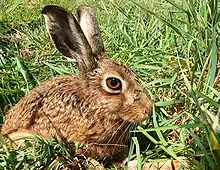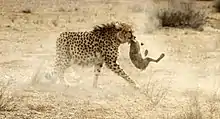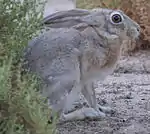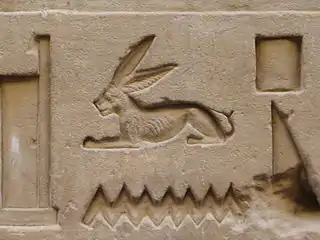Cape hare
The Cape hare (Lepus capensis), also called the desert hare, is a hare native to Africa and Arabia extending into India.[1]
| Cape hare | |
|---|---|
 | |
| Scientific classification | |
| Kingdom: | Animalia |
| Phylum: | Chordata |
| Class: | Mammalia |
| Order: | Lagomorpha |
| Family: | Leporidae |
| Genus: | Lepus |
| Species: | L. capensis |
| Binomial name | |
| Lepus capensis | |
 | |
| Geographic range | |
| Cape hare in hieroglyphs | |||
|---|---|---|---|
wn "Cape/desert hare" in Ancient Egyptian hieroglyphs | |||
Characteristics
The Cape hare is a typical hare, with well-developed legs for leaping and running, and large eyes and ears to look for threats from its environment. Usually, a white ring surrounds the eye. It has a fine, soft coat which varies in colour from light brown to reddish to sandy grey. Unusually among mammals, the female is larger than the male, an example of sexual dimorphism.
Habitat
It inhabits macchia-type vegetation, grassland, bushveld, the Sahara Desert and semi-desert areas. It is also common in parts of the Ethiopian highlands, such as Degua Tembien.[2]
Ecology

The Cape hare is a nocturnal herbivore, feeding on grass and various shrubs. Coprophagy, the consumption of an organism's own fecal material to double the amount of time food spends in the digestive tract, is a common behaviour amongst rabbits and hares. This habit allows the animal to extract the maximum nourishment from its diet, and microbes present in the pellets also provide nutrients.
Like other hares, they run fast. The only predator which is capable of outrunning them is the cheetah. All other predators are ambush and/or opportunistic hunters; examples of these are leopards, caracals, and black-backed jackals.
After a 42-day-long pregnancy, the female gives birth to from one to three young, termed leverets, per litter and may have as many as 4 litters per year. A characteristic of hares which differentiates them from rabbits is that the young are born precocial; that is, the young are born with eyes open and are able to move about shortly after birth. The Cape hare is no exception in this regard.
Gallery
 Cape hare (Lepus capensis arabicus) photographed at Watba Camel Race Track, Abu Dhabi, United Arab Emirates
Cape hare (Lepus capensis arabicus) photographed at Watba Camel Race Track, Abu Dhabi, United Arab Emirates Cape hare hieroglyph depicted at the Temple of Edfu
Cape hare hieroglyph depicted at the Temple of Edfu
Taxonomy
Currently, 12 subspecies are recognised:[3]
- Lepus capensis capensis
- Lepus capensis aquilo
- Lepus capensis carpi
- Lepus capensis granti
- Lepus capensis aegyptius
- Lepus capensis hawkeri
- Lepus capensis isabellinus
- Lepus capensis sinaiticus
- Lepus capensis arabicus
- Lepus capensis atlanticus
- Lepus capensis whitakeri
- Lepus capensis schlumbergi
References
| Wikimedia Commons has media related to Lepus capensis. |
- Johnston, C.H.; Robinson, T.J.; Child, M.F. & Relton, C. (2019). "Lepus capensis". IUCN Red List of Threatened Species. 2019: e.T41277A45186750.
- Aerts, R. (2019). "Forest and woodland vegetation in the highlands of Dogu'a Tembien". In Nyssen J.; Jacob, M.; Frankl, A. (eds.). Geo-trekking in Ethiopia’s Tropical Mountains: The Dogu’a Tembien District. Springer International Publishing. ISBN 9783030049546.
- Hoffman, R.S.; Smith, A.T. (2005). "Order Lagomorpha". In Wilson, D.E.; Reeder, D.M (eds.). Mammal Species of the World: A Taxonomic and Geographic Reference (3rd ed.). Johns Hopkins University Press. pp. 196–197. ISBN 978-0-8018-8221-0. OCLC 62265494.

